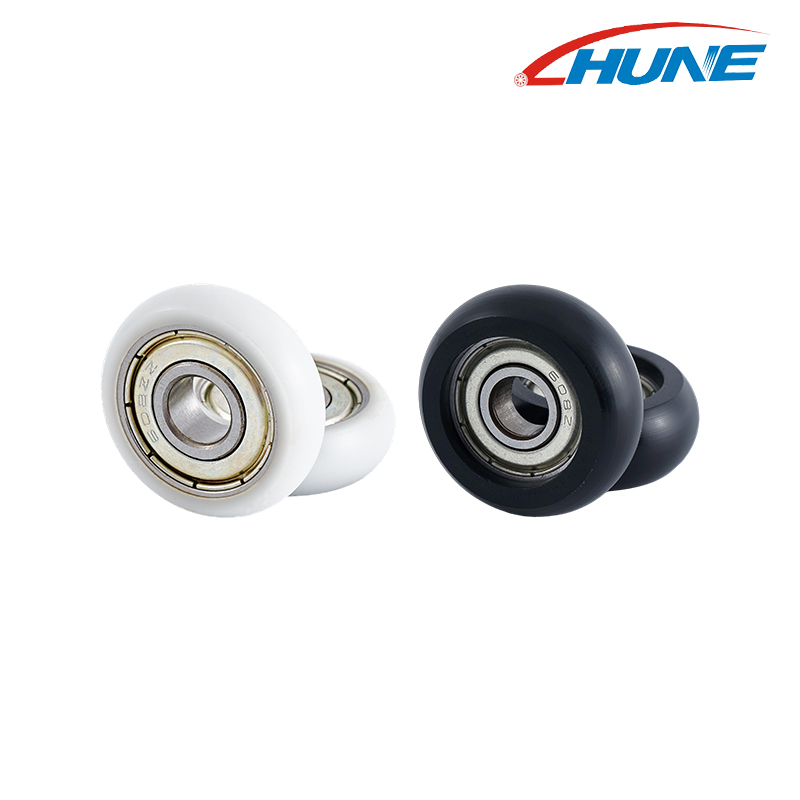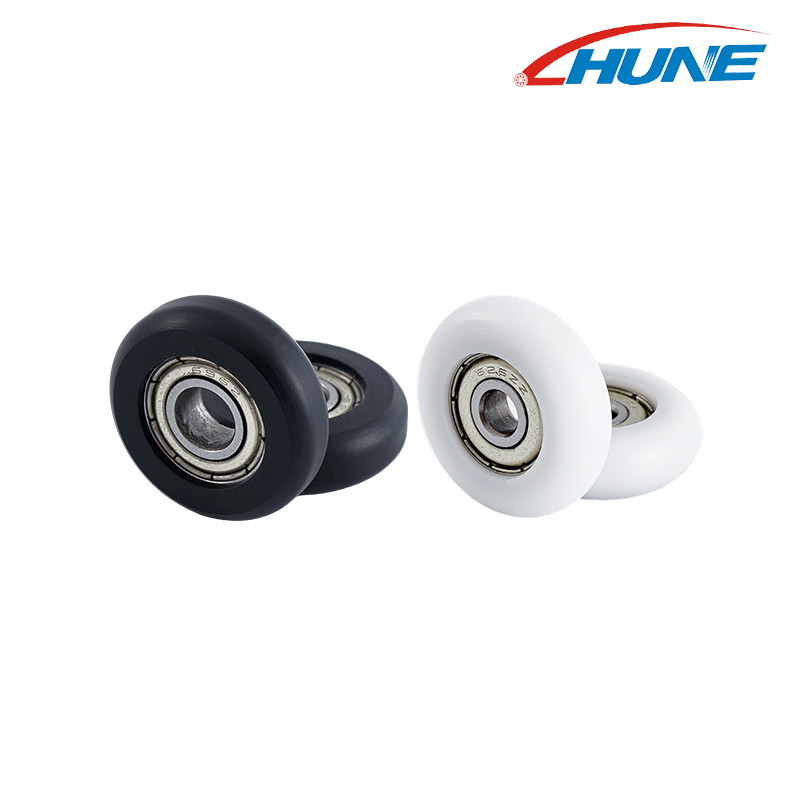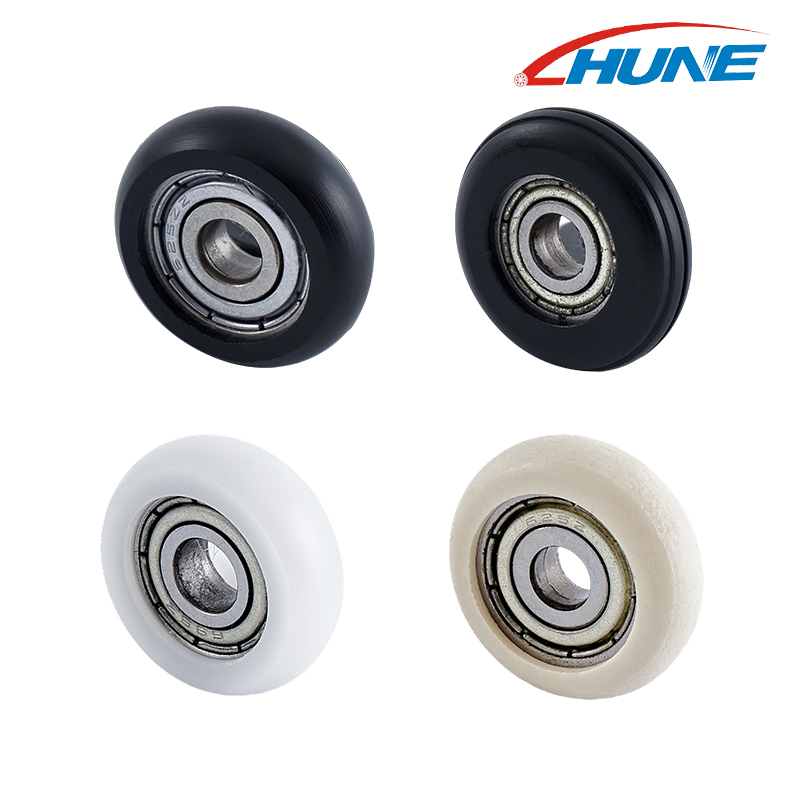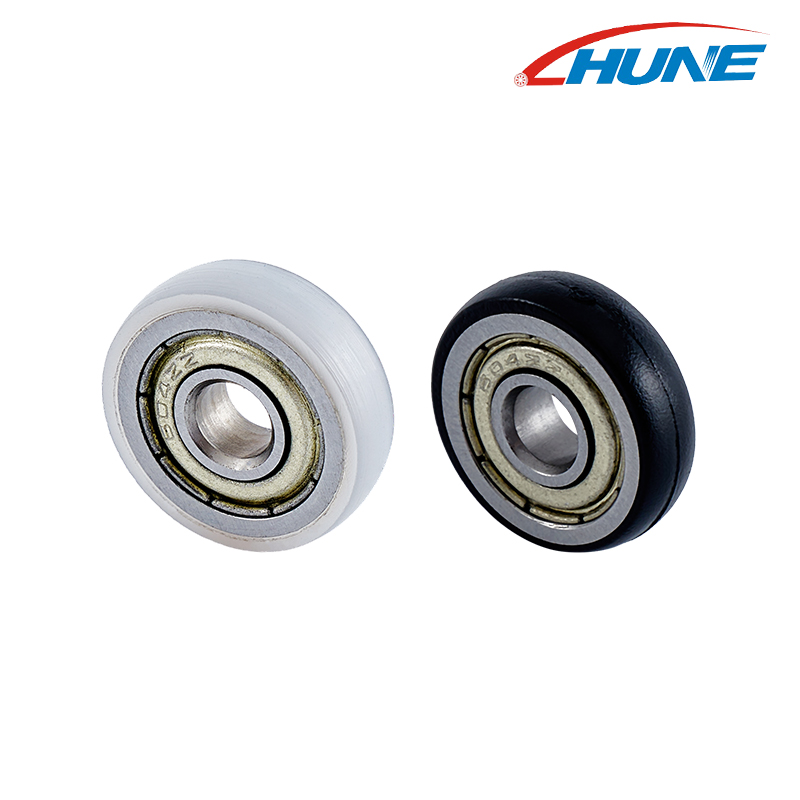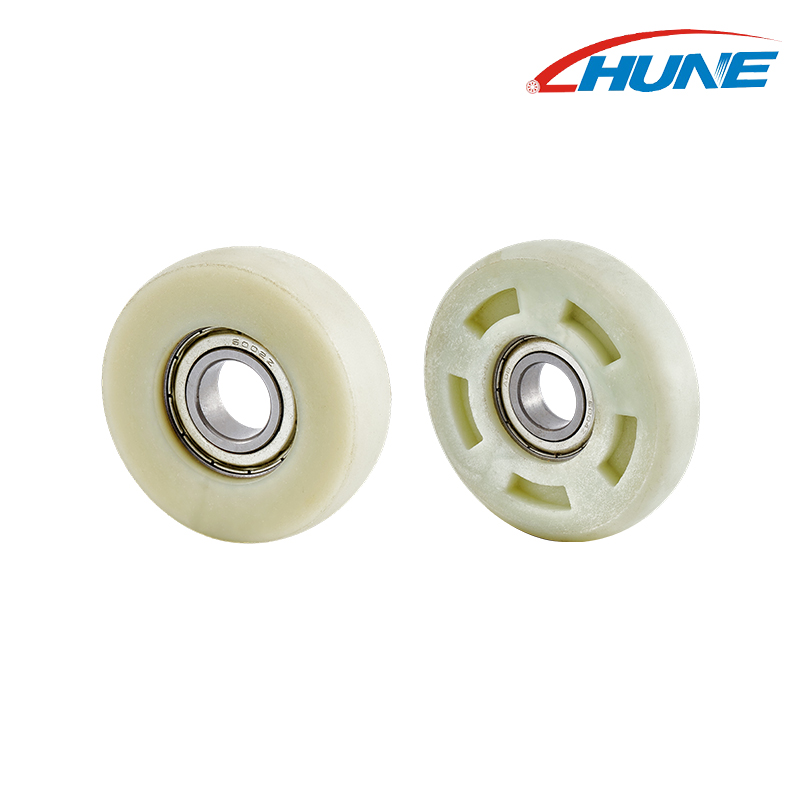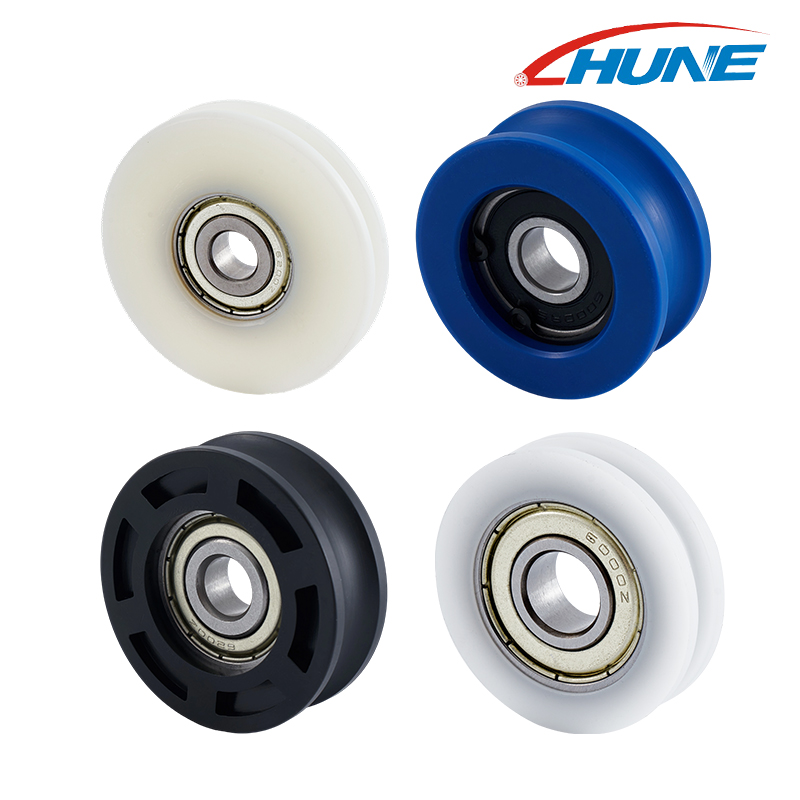Garage door rollers are essential for ensuring smooth and quiet door operation, performing the dual function of supporting part of the door's weight and guiding its movement along the track. Their performance depends on design, materials, and bearing structure. High-quality rollers use low-friction, wear-resistant materials and are equipped with precision sealed bearings, which reduce friction and noise, protect the track, and lessen the load on the opener, preventing motor overload. When rollers are properly matched to the door's weight and usage conditions, long-term reliable operation can be achieved, minimizing maintenance and replacement costs.
Types of Garage Door Rollers
Nylon Rollers
Nylon rollers are popular in residential garage doors due to their quiet and smooth operation. The material naturally reduces friction and vibration, making them ideal for environments where noise reduction is important. High-quality nylon rollers with multiple sealed bearings offer excellent durability, maintain consistent movement, and reduce wear on both tracks and the door opener.
Steel Rollers
Steel rollers are engineered for strength and high load-bearing capacity, making them suitable for heavy-duty or commercial garage doors. While they may generate more noise than nylon rollers, steel rollers provide superior durability and can handle frequent door cycles or large door weights. Properly maintained steel rollers are often preferred in industrial environments, warehouses, and high-traffic installations.
Plastic Rollers
Plastic rollers are lightweight and low-cost options, generally used for small or infrequently operated doors. However, they are less durable than nylon or steel, prone to faster wear, and can lead to rough movement or increased noise over time. Plastic rollers are suitable only for light-duty applications where long-term performance is not a priority.
Sealed vs. Unsealed Bearings
Garage door rollers may feature sealed or unsealed bearings, which impact maintenance requirements and lifespan. Sealed bearings are enclosed to prevent dust, moisture, and debris from entering, offering smoother operation and reduced upkeep. Unsealed bearings require periodic lubrication and are more vulnerable to environmental wear but can perform effectively in controlled or low-usage conditions.
|
Roller Type |
Key Features |
Best For |
|
Nylon Rollers |
Quiet, smooth operation; reduces friction and vibration; durable with sealed bearings |
Residential doors where noise reduction matters |
|
Steel Rollers |
High strength; handles heavy loads; durable; slightly noisy |
Commercial or heavy-duty doors with frequent use |
|
Plastic Rollers |
Lightweight; low-cost; less durable; prone to wear and noise |
Light-duty or infrequently used small doors |
|
Sealed Bearings |
Enclosed; low maintenance; smooth operation |
Most residential and commercial doors needing long life |
|
Unsealed Bearings |
Exposed; requires lubrication; more prone to wear |
Controlled environments or low-usage doors |
Key Factors to Consider When Choosing Garage Door Rollers
Choosing the right garage door rollers is crucial for ensuring the long-term performance, durability, and smooth operation of your garage door system. Whether you're replacing old rollers or selecting rollers for a new installation, understanding the factors that influence roller selection is essential.
1. Diameter and Sizing Requirements
The diameter of garage door rollers is one of the most important factors in ensuring smooth operation. Rollers must be sized correctly to fit the door's track and prevent misalignment or increased friction, which can lead to premature wear on both the rollers and the track.
- Correct Sizing: Rollers come in various diameters, typically ranging from 1.75 inches to 2.5 inches. The correct size depends on the type of track used and the weight of the door. A professional assessment can help you choose the right diameter to avoid issues with door balance and smoothness.
- Impact of Incorrect Sizing: If the roller is too large or small for the track, it can cause the door to function improperly, leading to uneven wear and tear. This may affect the door's opening and closing mechanisms, causing jerky or noisy operation.
2. Bearing Count and Smoothness
Bearings play a key role in how smoothly garage door rollers operate. They reduce friction between the roller and the track, allowing the door to move effortlessly and quietly.
- Bearing Count: The number of bearings in a roller directly impacts its smoothness and durability. More bearings generally result in smoother, quieter operation and improved longevity. High-quality rollers with a higher bearing count distribute the weight more evenly, reducing wear on the door system.
- Bearing Materials: High-end rollers often use sealed ball bearings, which are more efficient and require less maintenance. These bearings protect the internal components from dirt, moisture, and dust, enhancing the roller's performance and lifespan.
- Smoothness: Smooth rollers improve overall door performance and reduce strain on the opener motor, which can extend the motor's life. The smoother the roller's movement, the less noise and wear it will create over time.
3. Load Capacity Based on Door Weight
The load capacity of garage door rollers is critical for safe, efficient operation. Choosing the right rollers based on your door's weight is essential to prevent overloading, which can lead to roller failure and costly repairs.
- Heavy-Duty vs. Standard Rollers: Standard rollers are sufficient for lighter doors, typically made of aluminum or lightweight steel. However, for heavier doors—such as wooden, insulated, or steel-reinforced models—you will need heavy-duty rollers that are specifically designed to handle the added weight.
- Manufacturer Specifications: Always refer to the roller manufacturer's load capacity ratings. Overloading a roller beyond its rated capacity can cause the bearings to wear out quickly, leading to premature failure and potential damage to the entire door system.
- Consideration for Frequent Use: For doors that undergo frequent use, such as in commercial applications, you’ll want rollers that are designed to support higher loads over a greater number of cycles.
4. Noise Reduction Considerations
Noise reduction is a major factor, especially for residential applications where quiet operation is highly valued. The type of roller and bearing system you choose can significantly impact the noise level of your garage door.
- Nylon Rollers for Quiet Operation: Nylon rollers are known for their ability to minimize noise during operation. These rollers use a combination of low-friction bearings and nylon material to reduce vibration and sound, making them ideal for residential properties where quiet operation is a priority.
- Steel Rollers and Noise: Steel rollers are more durable and better suited for heavy-duty applications, but they tend to be noisier due to metal-to-metal contact. In noisy environments, such as commercial buildings or garages with high traffic, steel rollers may be more acceptable.
- Sealed Bearings: Rollers with sealed bearings can further reduce noise by preventing dirt and debris from entering the bearing, which would otherwise create friction and noise.
5. Compatibility With Your Track and Hinges
Ensuring compatibility between your rollers, track, and hinges is critical for the overall performance of your garage door. If the components do not fit properly, it can lead to misalignment, excessive wear, and operational inefficiencies.
- Track Types: Garage door tracks come in different styles (standard, curved, or deep-groove). The roller must match the type of track installed to ensure smooth operation. For example, deep-groove tracks are often used in high-end residential or commercial applications, requiring rollers specifically designed for such tracks.
- Hinge and Track Alignment: Rollers should fit seamlessly with the door's hinges and track system. Misalignment of any of these components can lead to uneven movement, excessive wear, or the door becoming stuck in place.
- Consult a Professional: In some cases, it's best to consult with a professional to ensure all components (track, rollers, and hinges) are compatible with each other. Professional guidance ensures that your door system operates safely and efficiently over time.
Comparing Roller Materials for Different Applications
Residential Garage Doors
For most residential garage doors, nylon rollers are the ideal choice. They provide:
- Quiet operation: Nylon naturally absorbs vibration, reducing noise during opening and closing.
- Smooth movement: Low-friction material allows the door to glide effortlessly along the track.
- Durability: When combined with sealed bearings, nylon rollers last for years with minimal maintenance.
- Reduced wear: Nylon rollers minimize friction against the track, protecting both the track and the door opener.
Nylon rollers are particularly suitable for single-family homes or townhouses where noise reduction and smooth daily operation are priorities.
Commercial and Heavy-Duty Garage Doors
For high-traffic or heavy-duty doors, such as those in warehouses, factories, or commercial properties, steel rollers or reinforced nylon rollers with multiple bearings are recommended. Benefits include:
- High load-bearing capacity: Steel rollers can handle larger and heavier doors without deformation.
- Extended lifespan: Durable materials withstand frequent cycles over long periods.
- Reliability under stress: Steel rollers maintain performance under heavy usage, reducing downtime.
While steel rollers are typically noisier than nylon, their strength and resistance to wear make them indispensable for commercial or industrial applications.
Balancing Durability and Noise
Selecting the right roller often involves balancing durability with noise reduction:
- Nylon rollers: Quieter, smoother, and ideal for residential use, but slightly lower load capacity.
- Steel rollers: Extremely durable and suitable for heavy-duty applications, but may generate more operational noise.
Why Regular Garage Door Maintenance Is Essential
Proper maintenance of garage door rollers is critical to ensure safe, efficient, and long-lasting operation. Neglecting maintenance can result in noisy operation, uneven wear, or even premature failure. Key maintenance practices include:
- Bearing Lubrication: Even sealed bearings benefit from periodic lubrication to reduce friction and extend lifespan.
- Inspection for Wear and Damage: Check for cracks, flat spots, or worn bearings to avoid performance issues.
- Track Cleaning: Remove debris, dust, or rust that can impede roller movement and cause uneven wear.
- Hardware Check: Tighten bolts, screws, and hinges regularly to prevent misalignment and rattling.
- System Testing: Manually operate the door to ensure smooth motion and proper alignment before using the opener.
Consistent operation relies on durable rollers, proper alignment, and reliable production quality—key strengths of Hune as a dedicated garage door roller factory committed to long-term system stability.
Frequently Asked Questions about Garage Door Rollers
How Often Should Garage Door Rollers Be Replaced?
- Garage door rollers typically last 7–12 years, depending on the door's weight, usage frequency, and environmental conditions. Heavy-duty or frequently used doors may require replacement sooner. Regular inspection for wear or damage helps determine the optimal replacement time to prevent performance issues.
Should I Choose Sealed or Unsealed Bearings for My Rollers?
- Sealed bearings are enclosed to prevent dust, moisture, and debris from entering. They require minimal maintenance, provide smoother operation, and extend the roller's lifespan.
- Unsealed bearings require regular lubrication and are more susceptible to wear. They can work well in controlled environments but may not be ideal for residential doors exposed to dust or moisture.
What Type of Rollers Are Best for Heavy-duty or Commercial Doors?
- For heavy-duty or commercial doors, steel rollers or reinforced nylon rollers with multiple bearings are recommended. They offer high load-bearing capacity, durability, and resistance to frequent cycles, ensuring long-term reliable performance even under high stress.
Are Nylon Rollers Durable Enough for Frequent Use?
- High-quality nylon rollers with sealed bearings are durable and can handle frequent residential use. However, for extremely heavy doors or commercial applications, steel rollers may be more suitable due to their higher load capacity and robustness.
Can Misaligned Rollers Damage My Garage Door or Opener?
- Yes. Misaligned rollers can cause uneven wear, increase friction, and place excessive stress on the door opener. This can lead to noisy operation, premature component failure, or even damage to the entire garage door system. Regular inspection and proper installation are essential.
Do I Need Different Rollers for Insulated or Wood Garage Doors?
- Yes. Heavier doors, such as insulated or solid wood doors, require rollers with higher load capacity, such as steel or reinforced nylon rollers. Standard nylon or plastic rollers may not withstand the additional weight, leading to premature wear or operational issues.
How Does Bearing Count Affect Roller Performance?
- Rollers with a higher number of bearings distribute weight more evenly, reduce friction, and provide smoother, quieter operation. Multiple bearings also improve durability and extend the roller's lifespan, making them ideal for both residential and commercial doors.
Where Can I Buy High-Quality Garage Door Rollers?
- High-quality garage door rollers can be purchased directly from Hune, a trusted factory specializing in durable and precision-engineered rollers for residential, commercial, and industrial applications. Hune offers a range of materials, bearing types, and sizes to match different door systems, ensuring smooth, reliable, and long-lasting performance.






 English
English  Español
Español  日本語
日本語 